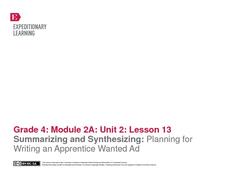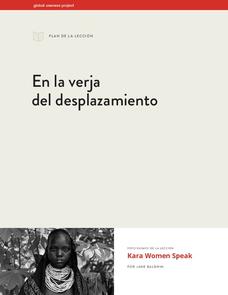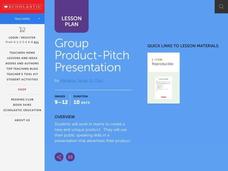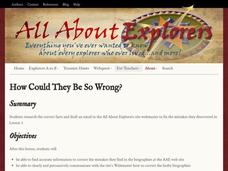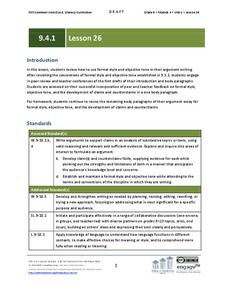Curated OER
Persuasive Writing and Speaking
Rhetorical appeals (pathos, logos, and ethos) are the focus of a series of exercises that asks class members to brainstorm topics for persuasive speeches, groups to craft a persuasive speech about one of the topics, and individuals to...
Curated OER
Sounds of the Season
During Christmas time, use common carols and Tchaikovsky's Nutcracker music as the basis for writing advertisements. Learners can work in teams or individually as they listen to songs via the links provided. A "Christmas Music Comparison...
EngageNY
Summarizing and Synthesizing: Planning for Writing an Apprentice Wanted Ad
In instructional activity 13 of this unit on colonial trade, young researchers learn about apprentices as they prepare to write help-wanted ads for the specific trade they have been researching. To begin, the class listens closely as the...
Everett Public Schools
High School Writing: Student Guide
Here's an amazing writing guide that deserves a place in your curriculum library. The 136-page packet provides focus lessons on the writing process, expository, persuasive, and timed writing, the Cornell system of note taking, and more....
Global Oneness Project
On the Verge of Displacement
By having scholars tackle this interdisciplinary lesson, they'll see how social studies and environmental science are related as they explore the impact that the construction of a dam will have on the population and ecosystem of the Omo...
Curated OER
Group Product-Pitch Presentation
Are you just about to teach persuasion in your class? If so, you should consider this short unit. In small groups, learners create a product, develop a magazine ad for the product, and pitch this product to the class using a visual...
K20 LEARN
Ethos, Logos, Pathos: Persuading Your Audience
Ethics, emotion, reason—scholars investigate advertisers' persuasive techniques to attract buyers. After examining the techniques used in infomercials, writers craft a persuasive essay on a topic of their choice.
K20 LEARN
Introduction to Arguing Effectively: Argument Writing
Which is better—Chick-fil-A or MacDonalds? High schoolers learn how to craft an argument essay by beginning an opinion statement. They state a claim, back up their claim with evidence, and consider counter calms. Scholars then create a...
University of Kansas
Newspaper in the Classroom
Newspapers aren't only for reading—they're for learning skills, too! A journalism unit provides three lessons each for primary, intermediate, and secondary grades. Lessons include objectives, materials, vocabulary, and procedure, and...
Virginia Department of Education
The Writing Process for Persuasive Writing
Get your junior high writers stimulated with the strategies and ideas available in this activity. Learners discuss and debate controversial subjects, and outline their reasons with an online graphic organizer (link included) that creates...
Ohio Literacy Resource Center
Arguing with Aristotle Ethos, Pathos, Logos
Introduce your classes to the Art of Rhetoric with a lesson that focuses on Aristotle's persuasive appeals and how they have been used, both ethically and unethically, to influence opinion.
Scholastic
Presenting Persuasively (Grades 6-8)
Teens and pre-teens are a prime target for advertisers, so how are they doing it? An interactive activity highlights the strategies used by advertisers, such as visual imagery and verbal clues. Then, a short writing assignment puts those...
Maryland Department of Education
The Concept of Identity Lesson 7: Logical Fallacies
What are the effects of competition in an academic environment? The competition between the main characters in A Separate Peace motivates a series of activities that asks readers to take a stance on competition, and then to develop a...
All About Explorers
How Could They Be so Wrong?
If it's on the Internet, it must be true ... right? Introduce young Internet explorers to the importance of fact-checking through a fun web-based activity. Pairs work together to read and analyze biographies about world explorers, then...
Curated OER
New Gun Control Politics: A Whimper, Not a Bang
Using an article from The New York Times, learners answer discussion questions about gun control. They are divided into four groups to research different standpoints on gun control, including the Executive Office, Congress, Gun Control...
Museum of Tolerance
Immigration Journeys
Through the journey of four stories of immigration, scholars complete graphic organizers and apply knowledge to create a visual representation of their findings on a large poster. Third and fourth readers write a letter to their family...
Roald Dahl
George's Marvelous Medicine
Six lessons comprise a unit about Roald Dahl's George's Marvelous Medicine. Over time, scholars explore themes such as the power of words, exciting writing, and mixed feelings. They examine the writing's literary devices, persuasive...
K20 LEARN
Speak Up! Four Categories Of Speeches
High schoolers examine the four major types of speeches: informative, demonstrative, persuasive, and extemporaneous. Groups then select one type and craft and share a presentation highlighting this format's characteristics. Finally,...
National Endowment for the Humanities
A Debate Against Slavery
Slavery is a serious topic that can be challenging for middle schoolers to study. Young scholars can see firsthand through primary sources what occurred during that time period in the United States. The third of five lessons provides...
K20 LEARN
Arguing With Evidence: Deconstructing Arguments Part 1
In the first lesson in a two-part series, high schoolers pick a social issue important to them and examine an article about the topic, the arguments and evidence used to support the writer's stance, and craft two counter-arguments to the...
K20 LEARN
Trigger Warnings - Intellectual Rights and Responsibilities: Banned Books, Censorship Part 1
"Warning: Conducting this lesson may be harmful." Such statements, called "Trigger Warnings," are the focus of a two-part lesson that looks at censorship, especially the pros and cons of trigger warnings. Class members read two articles,...
Anti-Defamation League
Microaggressions In Our Lives
Defining, identifying, and learning how to counter microaggression is the lesson's focus for high schoolers. Learners examine a definition of the term, write about their own experiences with microaggression, watch short video examples,...
EngageNY
Grade 9 ELA Module 4, Unit 1, Lesson 26
The focus of the day's instructional activity is methods for creating a formal style and objective tone in an argument essay. After examining models, pairs engage in peer review of their essay drafts and continue to revise while...
Trinity University
Julius Caesar: The Power of Persuasion
"Friend, Romans, countrymen, lend me your ears..." Those words begin one of the most persuasive speeches in literature. Explore the elements of persuasion in a series of lessons related to William Shakespeare's Julius Caesar. In addition...




